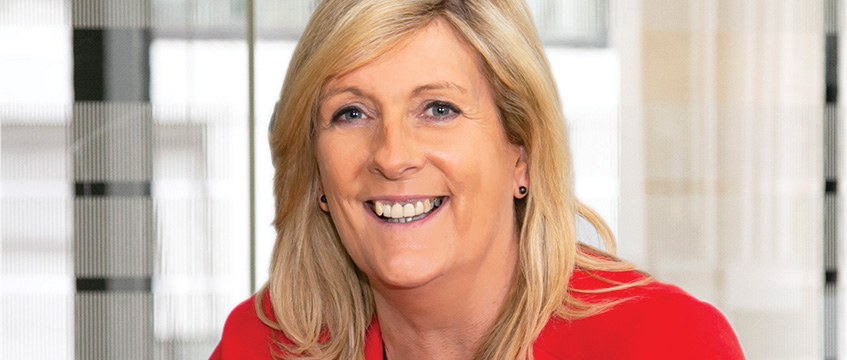The NHS estate includes more than 16,000 acres of land – roughly 20 times the size of the City’s Square Mile. The sheer scale of this is daunting indeed, and according to Elaine Hewitt, chief executive of NHS Property Services, it is imperative that the organisation raises cash by slimming down its property portfolio if it is to remain viable.
NHS Property Services, a private limited company wholly owned by the Department of Health and Social Care, has raised £300m in the past three years alone through real estate disposals.
Hewitt says: “We have reinvested the £300m in capital projects – new build, maintenance and refurbishment. We have also supported the government’s drive to deliver more housing by creating more than 5,000 new housing units.”
Hewitt, who joined NHS Property Services in 2015, has a background in commercial real estate. She worked at BT for 25 years before joining the Cabinet Office as crown representative for property in 2014.
Any cost saving NHS Property Services makes flows directly back to its NHS occupiers, says Hewitt. “If we deliver a saving, they get the benefit directly. If we realise value by selling surplus land and buildings, those capital receipts are ring-fenced in the company and we reinvest those funds directly to improve the NHS estate.”
Currently, NHS Property Services owns between 10% and 15% of the total NHS estate. However, Hewitt adds that it is important to distinguish between “ownership and management”.
“We don’t need to own property to manage it well,” she says. “We help, advise and develop strategic asset management plans to optimise the estate, but dispose of property only once it has been declared surplus – we don’t decide when it is released, that is a clinical decision.”
NHS Property Services encompasses around 3,000 buildings with roughly a £3bn market value across around 30m sq ft and 7,000 tenants. There are 5,000 people in the company.
“We have inherited assets from other parts of the NHS,” Hewitt says. “Back in 2015 we were roughly 3,500 people here; now we are at 5,000 as many people have transferred over to us.”
Flexible workspace move
But disposing of land and property is not enough. The NHS is also under pressure to rethink ways of working and embrace technology. With health experts warning that the NHS is unable to train enough GPs and nurses to meet demand, NHS Property Services has stepped in to create a flexible space offering.
Just as co-working giant WeWork offers private offices that are bookable for a day or an hour, the NHS is poised to run a similar service with the upcoming launch of “Open Space”.
The new offering will allow NHS partnerships or private sector organisations to offer their services on a bookable basis. They will have access to clinical space, meeting rooms and offices.
NHS Property Services has been trialling Open Space for the past 12 months across 17 properties in England.
The service will be based at NHS “hubs”, which offer a combination of pre-bookable and urgent appointments. They consist of GP practices that have come together to offer a wider range of “out of hospital” services on site, linking in with other organisations, including private sector companies.
Hewitt says: “New GP hubs will be providing a range of services alongside other NHS partners such as social care support, exercise or nutritional advice and community services.”
This summer, NHS Property Services will make a decision over how it will expand the new offering. “It will be demand-led,” Hewitt says. “There is a level of upfront investment to get the sessional space offer working in way that it should. We need to invest wisely.”
The move comes after the NHS published its Long Term Plan, which sets out how the £20.5bn budget settlement for the NHS, announced by the prime minister in summer 2018, will be spent over the next five years.
The plan includes measures to improve out-of-hospital care by supporting primary medical and community health services.
Hewitt explains: “The NHS strategy has fundamental estate implications which we can support. A lot of patients who go to see GPs have a range of conditions – and the ageing population can be suffering from a mix of medical and social issues, such as loneliness.”
From a property perspective, Hewitt says, Open Space can support this transition.
Hewitt says the service will be open to a range of clients. “They can be GP partnerships or external providers who may wish to offer health and fitness support, physiotherapy or social care on a sessional and bookable basis. The benefit to GPs of this broader service offering is they can start to treat the whole person to improve patient care and relieve pressure on acute hospitals.”
The NHS is using sensor technology to make the system work more efficiently. “We are using tech to show when a room is used or not used – and if it has been booked whether it actually has been used, in order to optimise estate utilisation.”
Clearly, the NHS is a long way behind the likes of WeWork in terms of embracing technology and starting a new trend in its field. But for Hewitt, measures such as these are at least the beginning of a wider effort to ensure the NHS remains viable for years to come.
“At a more macro level, the NHS is at an inflection point,” she says. “It is having to substantially transform to meet the changing healthcare needs of the population.”
Daunting indeed.
To send feedback, e-mail anna.ward@egi.co.uk or tweet @annaroxelana or @estatesgazette











